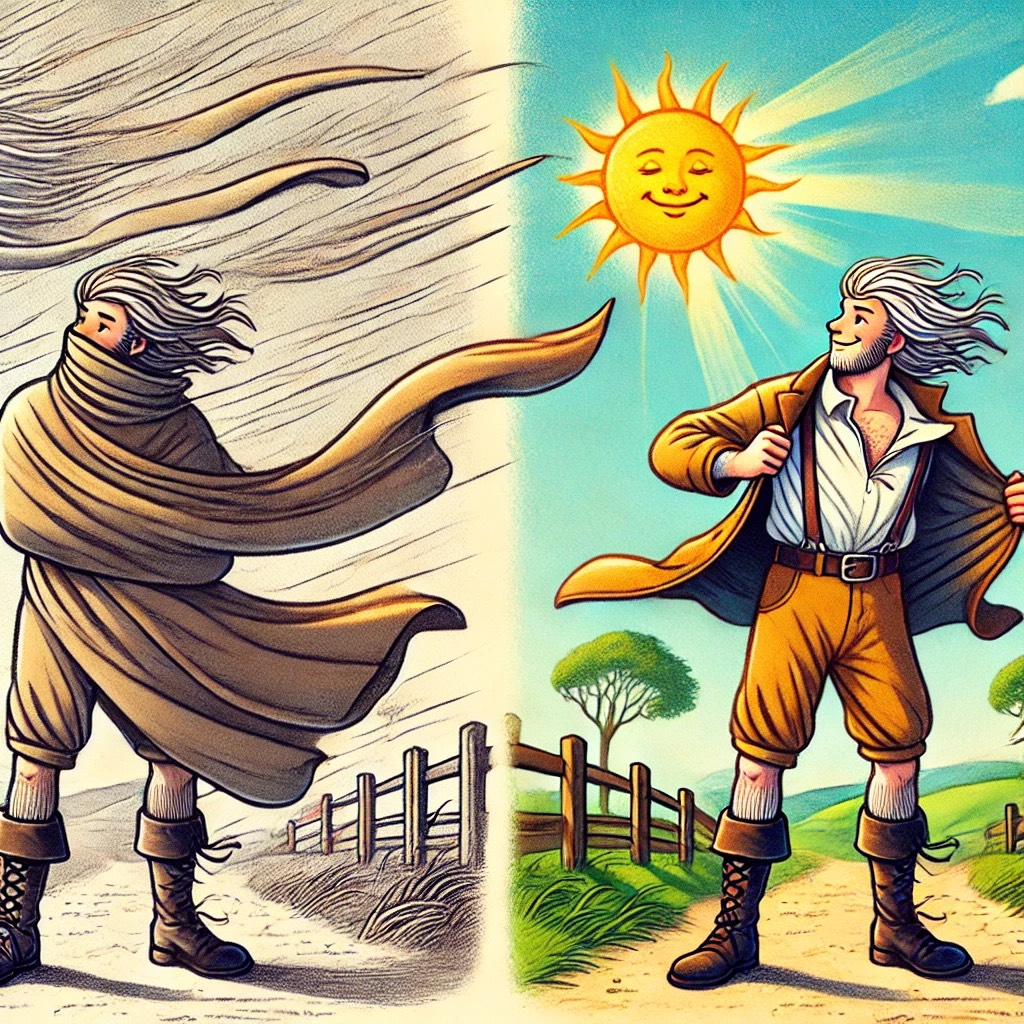
ほな、行くで、今日も有名な話の北風と太陽。まずは簡単な英文、その後単語リスト、その後文法解説や。レッツイソップ!

レ、、(決めゼリフ取られた)
The Wind and the Sun were arguing about who was stronger. Suddenly, they saw a traveller walking down the road. The Sun said, “I know how we can decide. Whoever can make the traveller take off his coat will be the winner. You can go first.”
The Sun went behind a cloud, and the Wind started to blow as hard as it could at the traveller. But the harder the Wind blew, the more the traveller held onto his coat. Finally, the Wind gave up.
Then the Sun came out and shone brightly on the traveller. Soon, the traveller felt too hot and took off his coat.
Kindness works better than force.
Wind – 風
Sun – 太陽
Arguing – 争っている
Stronger – より強い
Suddenly – 突然
Traveller – 旅人
Walking – 歩いている
Road – 道
Coat – コート
Winner – 勝者
First – 最初に
Behind – 〜の後ろに
Cloud – 雲
Started – 始めた
Blow – 吹く
Hard – 強く
Held onto – しっかりつかんだ
Finally – ついに
Gave up – 諦めた
Brightly – 明るく
Felt – 感じた
Hot – 暑い
Took off – 脱いだ
Kindness – 親切
Force – 力
1. The Wind and the Sun were arguing about who was stronger.
- The Wind and the Sun: 主語。「Wind(風)」と「Sun(太陽)」の2つの名詞が「and」で結ばれており、複数の主語を構成しています。
- were arguing: 過去進行形。「were」はbe動詞の過去形、「arguing」は動詞「argue(争う)」の現在分詞で、過去のある時点で動作が進行中であったことを表します。
- about who was stronger: 前置詞「about(〜について)」が、続く節「who was stronger(誰が強いか)」を導き、議論の内容を説明しています。「who」は疑問代名詞で、「was」はbe動詞の過去形、「stronger」は「strong(強い)」の比較級です。
2. Suddenly, they saw a traveller walking down the road.
- Suddenly: 副詞で、「突然に」という意味。動作が急に起こったことを表します。
- they: 主語。「Wind」と「Sun」を指す代名詞です。
- saw: 動詞「see(見る)」の過去形です。
- a traveller: 目的語。「traveller(旅人)」は数が不特定なので、不定冠詞「a」が使われています。
- walking down the road: 現在分詞「walking(歩いている)」が「traveller」を修飾しています。「down the road」は前置詞句で「道を下って」という意味です。
3. The Sun said, “I know how we can decide.”
- The Sun said: 主語「The Sun(太陽)」+動詞「said(言った)」の過去形です。
- I know: 主語「I(私)」+動詞「know(知っている)」の現在形です。
- how we can decide: 疑問詞「how(どのように)」が導く従属節。「we」は主語、「can decide」は助動詞「can(できる)」+動詞「decide(決める)」の原形で、「私たちが決める方法」という意味です。
4. Whoever can make the traveller take off his coat will be the winner.
- Whoever: 複合関係代名詞。「〜する者は誰でも」という意味です。
- can make: 助動詞「can(〜できる)」+動詞「make(させる)」の原形。「〜することができる」という意味です。
- the traveller take off his coat: 「make」の目的語。「the traveller(旅人)」が主語、「take off(脱ぐ)」は目的補語で、「コートを脱ぐ」という意味です。
- will be: 助動詞「will(〜だろう)」+動詞「be(なる)」の原形。「〜になるだろう」という未来の予測を表します。
- the winner: 名詞「winner(勝者)」を指し、「勝者になる」という意味です。
5. You can go first.
- You: 主語。
- can go: 助動詞「can(〜してよい)」+動詞「go(行く)」の原形。「行くことができる」という意味で、許可を示しています。
- first: 副詞で、「最初に」という意味です。
6. The Sun went behind a cloud, and the Wind started to blow as hard as it could at the traveller.
- The Sun went behind a cloud: 主語「The Sun」+動詞「went(行った)」の過去形。「behind a cloud」は前置詞句で、「雲の後ろに」という意味です。
- and: 接続詞。「そして」を表します。
- the Wind started to blow: 主語「the Wind」+動詞「started(始めた)」+不定詞「to blow(吹く)」。「吹き始めた」という意味です。
- as hard as it could: 「as ~ as…」の比較表現。「できる限り強く」という意味です。
- at the traveller: 前置詞句。「at」は「〜に向かって」という意味で、「traveller」を指します。
7. But the harder the Wind blew, the more the traveller held onto his coat.
- But: 接続詞。「しかし」という意味です。
- the harder the Wind blew: 比較表現。「the harder(より強く)」と「the Wind blew(風が吹く)」を使った文構造で、「風が強く吹けば吹くほど」という意味です。
- the more the traveller held onto his coat: 比較表現。「the more」は「より一層」を表し、「the traveller held onto his coat(旅人がコートをつかんだ)」が続きます。「風が強く吹けば吹くほど、旅人はさらにコートをしっかりとつかんだ」という意味です。
8. Finally, the Wind gave up.
- Finally: 副詞で「ついに」「最終的に」という意味です。
- the Wind gave up: 主語「the Wind(風)」+動詞「gave up(諦めた)」の過去形です。
9. Then the Sun came out and shone brightly on the traveller.
- Then: 副詞。「それから」という意味です。
- the Sun came out: 主語「the Sun(太陽)」+動詞「came out(現れた)」の過去形です。
- and: 接続詞。「そして」という意味です。
- shone brightly: 動詞「shone(輝いた)」+副詞「brightly(明るく)」で「明るく輝いた」という意味です。
- on the traveller: 前置詞句。「on(〜の上に)」+「the traveller(旅人)」で「旅人に向かって」という意味です。
10. Soon, the traveller felt too hot and took off his coat.
- Soon: 副詞。「すぐに」という意味です。
- the traveller felt too hot: 主語「the traveller(旅人)」+動詞「felt(感じた)」の過去形。「too hot(暑すぎる)」で「暑すぎると感じた」という意味です。
- and: 接続詞。「そして」という意味です。
- took off his coat: 動詞「took off(脱いだ)」の過去形。「his coat(彼のコート)」を目的語にして、「彼のコートを脱いだ」という意味です。
11. Kindness works better than force.
- Kindness: 主語。「親切」という意味です。
- works better: 動詞「works(効く)」+「better(より良く)」で、「より効果がある」という意味です。
- than force: 前置詞「than(〜よりも)」+名詞「force(力)」で、「力よりも」という意味です。

あとは繰り返しあるのみです。頑張ってください。

はい!



コメント